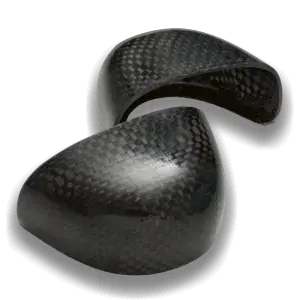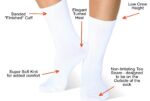Composite toe cap boots work as good as their steel counterparts in terms of providing protection against heavy falling or rolling objects besides being more comfortable and lightweight.
Yes, composite toe work boots are recommended for winters as their toe caps are made of non-metals such as Kevlar, carbon fiber, plastic and fiberglass that do not conduct the outside cold to the feet and therefore serve as a good insulating material!
In this guide, you’ll discover why composite toe caps stay warm in winters and are comfortable to wear during cold work environment. Let’s get started…
Reasons Composite Toe Boots Do Not Get Cold
Before moving on to the reasons, let us first understand the composition of the composite toe caps.
So, a composite toe cap is made up of the following materials:
-
-
- Plastic
- Fiberglass
- Kevlar
- Carbon fiber
-
None of the above mentioned materials are composed of metals and when there is no metal there cannot be conduction of cold because it is the metal that conducts the heat or cold to the body.
Therefore, composite toe caps being made of non-metals are bad conductors of heat and cold and do not conduct the outside cold to the feet in the winter season.
Now let’s talk about the materials in details:
1.) Fiberglass:
Fiberglass is actually a composite material that is made of plastic matrix reinforced with tiny glass fibers which is not only light weight but strong too. Now, glass is a bad conductor of heat and cold and therefore, fiberglass serve as a very good insulating material in boots.
2.) Carbon fiber:
Carbon fiber shows heat expansion 6x times less than aluminum and 4x times less than steel. So, with almost zero heat conductivity carbon fiber is a good insulator for cold temperatures too because if a material does not conduct heat, it’s obvious that it won’t conduct cold as well.
3.) Kevlar:
Kevlar is a form of plastic and is made of a chemical compound poly-para-phenylene terephthalamide. Being a form of plastic, it is obviously a bad conductor of heat and cold and provides insulation in the cold weather.
4.) Plastic:
Even a 7th or 8th grade student knows that plastic is a bad conductor of heat and cold so the composite toe cap made from it is sure to provide you the insulation from cold!
Are Composite Toe Boots Comfortable?
Composite toe boots are definitely very comfortable to wear because of their composition and weight. They are made of materials such as plastic, carbon fiber and Kevlar which are not only softer than steel but also lighter in weight as compared to their steel counterparts.
Composite toe boots usually come with good cushioning; wider toe box and heel support all adding to the comfort of these boots.
Other factors that make composite toe caps comfortable are:
-
-
- They are lighter in weight than their steel or alloy counterparts
- They do not conduct electricity
- They are softer in feel than their steel and alloy counterparts that are made of metals
- They offer the same protection against falling or rolling loads
-
Check out the video on best composite toe boots
Is composite toe better than steel toes and alloy toes in winter?
Steel toe caps:
There is no doubt in the fact that steel toe caps are made of the metal steel and that steel is a very good conductor of heat and cold. Steel does not have the slightest insulation properties and therefore conducts the cold from the environment directly to your toes and the feet.
Check comparison on steel toe vs composite toe boots.
Alloy toe caps:
Now speaking of the alloy toe caps; they are made of metals such as aluminum, titanium, etc and even they do conduct cold from the outside to the feet.
Check comparison on alloy toe vs composite toe boots.
Composite toe caps:
As I have already discussed above about the composition of the composite toe caps, they are all made of non-conducting materials and therefore keep your feet insulated from the outside cold temperatures.
Who wins the winter challenge?
It is definitely the composite toe caps which are better than steel toes and alloy toes in winter as the composite toe caps offer insulation from the cold weather.
See also: Composite, Alloy, or Steel Toe Boots: Which One is More Comfortable?
Thinsulate Ratings (the feature that actually keeps your feet warm):
Frankly speaking, it’s not the composite toe caps alone that would keep your feet warm, but the thinsulate insulation that is put in your boots that would do the job of saving your feet from letting in the outside cold!
Let’s learn about which thinsulate rating is ideal for which temperature:
1.) 200g thinsulate rating:
This is the most standard thinsulate rating and is generally used in most of the boots. 200g thinsulate insulation is enough for initial winter days and the end of the winters. This should be as well best suited for the workers who undergo strenuous physical activities and get a lot of sweat accumulation in their feet.
2.) 400g thinsulate rating:
400g insulation is enough for moderately cold winter days and you don’t need to do a lot of physical activities to keep your feet warm. In other words this thinsulate insulation is enough to keep your feet warm in the cold when the rest of the body is freezing.
Check out the guide on best work boots for winters to find the right boots for winters.
3.) 600g thinsulate rating:
This thinsulate rating is for freezing cold winters when there is snow all around. And you don’t have to even move a bit to produce the heat in your feet. This is for temperatures around 10 degree to 0 degree.
4.) 800g thinsulate rating:
The 800g thinsulate insulation is for below freezing temperatures when there is snow ice and rain all around and while your rest of the body would be freezing, your feet won’t even realize the cold. This is or temperatures around 0 degree to -20 degree.
5.) 1000g thinsulate rating:
This is the highs level of insulation you can get in any boots made on this earth! This is only ideal for temperatures around -20 degree to -50 degrees where even the boiling water takes less than a minute to freeze if taken out from the source of heat. Also around this temperature, the only source of heat is petroleum gas or liquid.
Are composite toe boots warmer?
I wouldn’t say that composite toe boots are warmer but they are a better option to wear during both the cold and hot weather days as compared to steel toe boots because they do not conduct heat or cold.
Thereby, keeping your feet warm in the cold temperatures, and cool in the warm temperatures. As a result, providing the wearer a great deal of good insulation without jeopardizing its breathability.
It’s time to bid Adieu!
So, the final answer is yes, the composite toe boots will definitely stay warm in winters with good thinsulate insulation and that composite toe caps are itself non-conductors of cold and heat!
That’s all for today’s article dear ladies and gentlemen!
Before going, do not forget to check on our expert tips on why and how even steel boots can be worn in the freezing winters!
Wish you all stay healthy and safe and…
Have a great day ahead!









